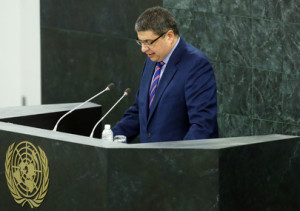 Statement by H.E. Ambassador Nicholas Emiliou
Statement by H.E. Ambassador Nicholas Emiliou
4 October, 2013
Mr. President,
Let me congratulate you for convening this timely meeting. Our gratitude is also extended to the Secretary General Ban Ki-moon for his efforts in galvanizing high political attention on the many linkages between development and migration and to welcome his report and his eight point agenda for action. Cyprus is fully associated with the statement made earlier by the European Union on behalf of its 28 member states. The following additional points are from a national perspective.
Since the first High-level Dialogue in 2006 we have witnessed some tangible progress. Just one example is remittance flows to developing countries which as the Secretary General indicates in his report, grew up to 401 billion last year. International migration has proved during the last 6 years that can be mutually beneficial to both countries of origin and destination, developing and developed counties alike and for South-South Cooperation. It has become a major factor shaping the global landscape and reality, a powerful force of social change and cultural interaction in the countries concerned. Migration provides migrants themselves with significant opportunities to progress. Today there is more clarity on and a better understanding of the many and complex effects of migration to the development of countries of origin and destination.
Mr. President,
The first High-level Dialogue was a historic event. By recognizing the importance of international migration to development, the international community has accepted the need to establish a more coherent political response to the phenomenon. 2006 has brought the international community one step further by creating the Global Forum on Migration and Development and by allowing the civil society to have voice and substantive engagement and cooperation with member states. The Global Forum as the Secretary General says in his report, after 6 years has become indispensable; it attracts more than 150 states and fosters a common understanding of migration. Cyprus fully supports the open and transparent process established by the Global Forum on Migration and Development and appreciates the opportunity it provides for a frank and focused dialogue as well as for sharing experiences and best practices. We firmly believe that the Forum should be further reinforced and strengthened in order to further improve its effectiveness.
Mr. President,
Numerous are the challenges of the development aspect of migration and their successful address is not an easy task. Both, countries of origin and destination must deal with issues such as brain drain; protection of migrant’s rights, minority integration, religion, citizenship, xenophobia, human smuggling and trafficking, national security. Human rights and protection of migrants, especially of women and children should be respected and promoted by all. They should be incorporated in policies at all levels, local, national, regional and international while measures should be adopted against illegal migration, human trafficking and smuggling ensuring at the same time that the migrants, who in search for a better life for them and their families become victims of smugglers and traffickers , are offered help, protection and assistance. In this context, I would also like to extend our deep condolences for yesterday’s tragic incident causing many migrant deaths.
Mr. President,
Cyprus is a country whose geopolitical position, has made it a receiver of strong mixed migratory pressures aggravated by its limited geographic and demographic size. On the one hand our close proximity to the Middle East, a sensitive geographic area plagued by serious political problems, wars, conflicts and economic instability, results to the fact that Cyprus receives disproportionate to its capacity numbers of illegal immigrants and asylum seekers. Despite pressure from mixed migratory flows, in recent years we have made significant progress in the management of these flows. We have managed to adopt and commenced the implementation of action plans for the integration of migrants into Cypriot society and combating trafficking in human beings, we have managed to greatly improve our asylum system while we are trying to effectively address the multiple challenges of these phenomena within the context of the EU. One of the key challenges we face today are related to the voluntary return of migrants in conjunction with the encouragement of mobility and cooperation with countries of origin.
Mr. President,
The importance of migration for the post-2015 development agenda cannot be overestimated. Migration is a key driver and an enabler for achieving the MDGs and a key factor for sustainable development. We need a coherent, humane, age and gender sensitive, rights and facts-based global agenda which can address today’s realities. This is a truly global challenge that requires a global and collective response. Only by working together we can succeed.